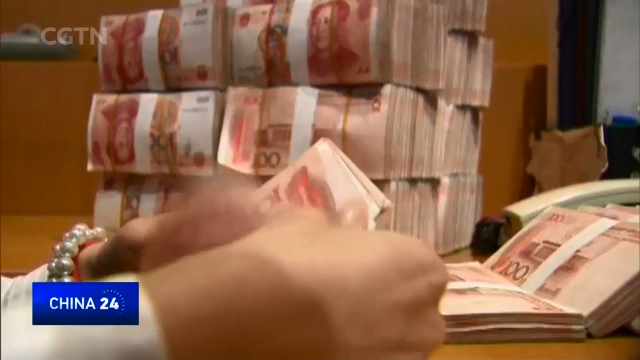
20:51, 29-Jun-2018
Renminbi Continues to Fall: Central bank sets yuan midpoint fixing against dollar at 6.6166
Updated
20:29, 02-Jul-2018
02:55

China's central bank has set the Renminbi midpoint fixing against dollar at 6.6166, continuing a drop that's lasted eight days. This round of Renminbi depreciations stems from a variety of reasons, and our reporter Chen Tong talks to the experts to find out more.
After a continuous appreciation that started in January, the Renminbi's value against US dollar began to fall in April and has continued down ever since. It's now at around 6.6 to the dollar, partly because of trade tensions between the two countries. The strong performance of the US dollar index has also been forcing the yuan down in comparison. The US dollar index has jumped by about 8 percent in the past two months. Other factors driving the Renminbi's depreciation have been the weak demand for the Chinese currency -- the narrowing spread of the sovereign bond yields between the United States and China has brought pressure on capital to move to the US.
DENG ZHIJIAN INVESTMENT STRATEGIST, DBS CHINA "I think in the trading market, the major currency is still USD. The demand on RMB is not very large. This is the biggest reason for the short-term depreciation of RMB. I think in the future, the demand of our RMB will depend on the bond market. The debt default is becoming larger than before. This is another reason our RMB demand is very short very little in these few months."
Since the beginning of the year, dozens of domestic companies have had to delay paying back bonded debt, and that has also reduced confidence in the Renminbi. Experts believe Renminbi's weakening trend will continue in the short term, but that there will be no dramatic fall.
JIMMY ZHU CHIEF STRATEGIST, FULLERTON MARKETS "The market is now is pretty comfortable with Chinese yuan, as we experienced in 2015 and 2016. But looking at the patterns in the past two years, any time of the yuan depreciation, it will go 3 percent first and take a break. Given the past two weeks Chinese yuan versus the dollar, it already depreciated around 3 percent. When the level approaching 6.63 to 6.64, probably it will take a break first."
The monetary policies of the People's Bank of China and the US Federal Reserve have been diverging for some months. With market expectations that the Federal Reserve will continue to raise interest rates in the second half of this year, and the Chinese central bank's monetary policies will continue to loosen, pressure on the Renminbi is likely to last for at least several months.

SITEMAP
Copyright © 2018 CGTN. Beijing ICP prepared NO.16065310-3
Copyright © 2018 CGTN. Beijing ICP prepared NO.16065310-3